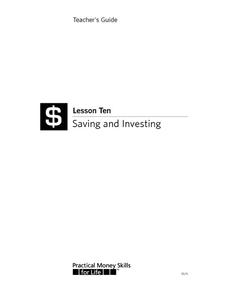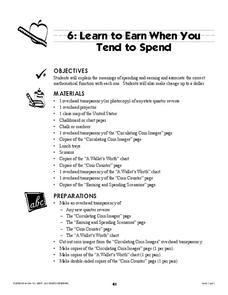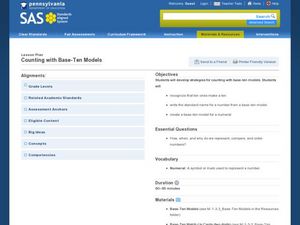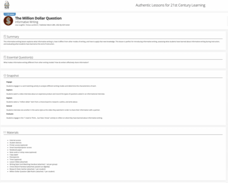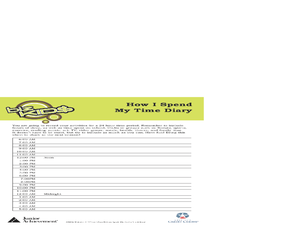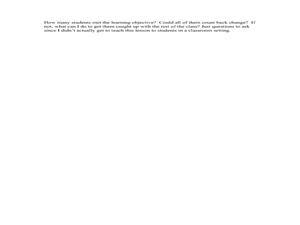Visa
Earning Money
Where does money come from? Is it limitless and always available? Introduce your youngsters to the concept of earning through jobs and/or chores with a matching activity and provided worksheets.
Visa
Allowances and Spending Plans
Help youngsters understand how to manage small amounts of money by discussing an allowance and the difference between spending, saving, and giving.
Practical Money Skills
Saving and Investing
Learn the difference between saving money and investing money, as well as the advantages and disadvantages of each. Kids review banking and personal finance terms before studying the different ways that people can reach their financial...
Visa
Making Spending Decisions
By role playing real-world experiences, such as purchasing snacks and grocery/toy store shopping, your youngsters will begin to develop an understanding of how to make decisions and choose between alternatives. This is the first lesson...
Visa
Saving and Investing
Impress upon your young adults the importance of saving and investing, and give them a foundational vocabulary from which they can continue to build their financial literacy. This lesson plan covers short- and long-term budget goals,...
Anti-Defamation League
Harriet Tubman on the $20 Bill: The Power of Symbols
How important are symbols and symbolic gestures in society? Middle schoolers have an opportunity to analyze the importance of symbols on American currency with a lesson that investigates the controversies surrounding redesigning the $5,...
Encyclopedia Britannica
Do the Campaign Math
Follow the money trail! As part of their study of the 2020 Presidential campaign, class members to research how much money candidates have raise and spent, as well as the sources of the funds. They then graph their findings to compare...
Curated OER
Counting Coins
Second graders identify a quarter, dime, penny, nickel, and dime. They match the coin with it's monetary value, collect data on excel spreadsheet, and create a graph in Excel. Students participate in group activities.
Curated OER
Learn to Earn When you Tend to Spend
Analyzing and understanding word problems is extremely important. Pupils learn that in money problems, earn usually means you add and spend usually means you subtract. They will solve a series of money-related word problems, label coins,...
Bowland
Explorers – Patrol Services
Far out — plan a trip to space! Aspiring mathematicians steer a space vehicle through an asteroid field, calculate currency exchanges to buy provisions, and determine placement of charges to blow up asteroids. Along the way, they learn...
Curated OER
Budget Mania
Students examine several examples of budgets to develop a facility with the components of its formation. Income, expenses, and expenditures are considered and itemized for this lesson.
Curated OER
Counting with Base - Ten Models
Help your kids develop strategies for counting. For this base-ten lesson, learners use matching cards, base 10 blocks, and dry erase markers and boards to examine the base 10 counting system.
EngageNY
Volume and Cavalieri’s Principle
Take a slice out of life. The ninth section in a series of 23 introduces classmates to Cavalieri's principle using cross sections of a cone and stacks of coins. Class members participate in a discussion using pyramids and how Cavalieri's...
Curated OER
You've Gotta Have a Gimmick!: A Lesson in Junk Food Advertising
Students examine marketing techniques used in television and magazine snack food ads. They analyze and discuss Internet kids clubs, complete various handouts that examine ads for food, and create a commercial for a food product.
Practical Money Skills
Understanding Credit
Help your young consumers learn about credit and the importance of credit history. With a thorough lesson about the ins and outs of credit, as well as the potential pitfalls of having a line of credit, kids will be well-equipped to...
K20 LEARN
The Million Dollar Question: Informative Writing
Introduce high school freshmen to the characteristics of informative writing with a 5-day lesson that distinguishes informative writing from other modes. Scholars learn how to search for and cite reliable resources, then research and...
Practical Money Skills
Using Banking Services
Using a bank is a privilege and a responsibility for young consumers. Teach them the important terms and details about creating accounts, using an ATM, and maintaining a credit card.
PBS
Cesar Chavez: Labor Leader and Civil Rights Activist
Cesar Chavez believed so much in the cause of farmworkers that he put his money where his mouth was. Chavez quit his well-paying job to organize them into labor unions. Using a speech, photograph, and short biographical video, pupils...
Texas Education Agency (TEA)
Financial Planning in Business
It's all about the Benjamins! Scholars conduct research about a franchise to determine how much money they need for a startup business and create a PowerPoint to share what they found. Also, they design an informative brochure to show...
Curated OER
How to Achieve Your Financial Goals
Students explore economics by creating a budget. In this financial goal setting lesson, students investigate their use of time by completing a worksheet. Students identify financial goals they would like to achieve in the next several...
Alabama Learning Exchange
No More Money Trouble
Young consumers explore money identification and counting. In this cross-curricular money instructional activity, they participate in comprehension and writing activities prior to and after reading the book Money Trouble by Bill Cosby....
Curated OER
Medieval Money
Students investigate the history of money as it was back then compare to now. In this algebra lesson, students analyze the type of money used in medieval times, the value of the currency and the coins used. They make a budget using...
Curated OER
Time Value of Money
Students evaluate the time value of money. In this economics lesson, students define inflation, interest, and the future value of money.
Curated OER
Money Game
Fourth graders give change of one dollar. In this decimal and fractions lesson, 4th graders receive fake coins and discuss what they could purchase with them. Students go for a walk and spend one dollar and get their purchase if they...
Other popular searches
- Money Lessons Giving Change
- Counting Money Lessons
- Canadian Money Lessons
- Second Grade Money Lessons
- 2nd Grade Money Lessons
- Australian Money Lessons
- Shopping Money Lessons
- Math Money Lessons
- Money Lessons Elementary
- Fun Money Lessons
- Counting Money Math Lessons
- Adding Money Amounts Lessons






